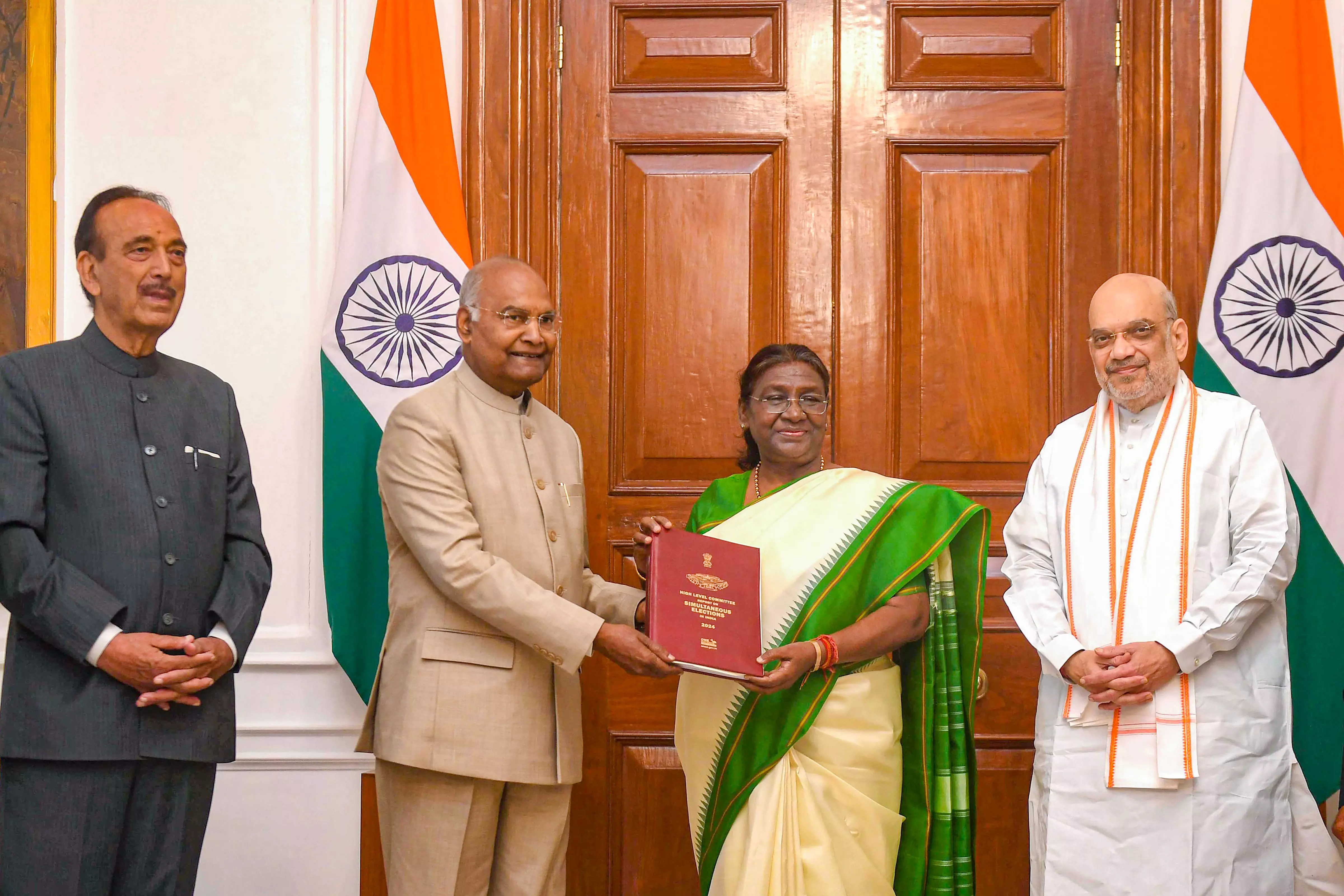
One nation, one election: Report cites 7 countries with similar polls, notes doubts too
Three former HC chief justices and one former state election commissioner objected to simultaneous polls, while the majority of those consulted supported it

The high-level committee on “one nation, one election” prepared its report, which was cleared by the Union Cabinet on Wednesday (September 18), after studying poll processes in seven countries.
It is mentioned in the report that the committee made the recommendation in favour of simultaneous elections by studying similar poll processes of South Africa, Sweden, Belgium, Germany, Japan, Indonesia, and the Philippines.
Report submitted in March
The committee, led by former president Ram Nath Kovind, submitted its report to President Droupadi Mumu in March, recommending simultaneous elections for Lok Sabha and state assemblies as the first step, followed by synchronised local body elections within 100 days.
The committee also consulted several former CJIs, chief justices of high courts, former chief elections commissioners and current and former state election commissioners before submitting its report. Three former high court chief justices and one former state election commissioner were reportedly among those who objected to the idea of simultaneous elections, while the overwhelming majority supported it.
Comparative analysis
According to the report that was cleared on Wednesday, a comparative analysis of other countries was drawn with the aim was to study and adopt the best international practices to ensure fairness and transparency in elections.
“In South Africa, voters cast their ballots for both the National Assembly and Provincial Legislatures simultaneously. However, municipal elections are held separately from provincial ones in a five-year cycle. On May 29, South Africa will hold its general elections to elect a new National Assembly as well as the Provincial Legislature for each province,” the report said.
The Swedish process
The panel noted that Sweden follows the proportional electoral system, which means that political parties are assigned a number of seats in the elected assembly based on their share of votes.
“They have a system where elections for the Parliament (Riksdag), County Councils and Municipal Councils all take place at the same time. These elections occur every four years on the second Sunday of September whereas elections to the municipal assemblies occur on the second Sunday of September, once every five years,” it said.
The German model
Subhash C Kashyap, former Secretary General, Lok Sabha, and a member of the committee, supported the German model of a constructive vote of no-confidence in addition to the procedure for the appointment of the chancellor made by the Bundestag.
“He also explained the process that is followed in Japan. In Japan, the prime minister is firstly appointed by the National Diet and thereafter accepted by the Emperor. He advocated adoption of a model similar to German or Japanese model. This, in his view, will also be beneficial to India,” the report said.
The Indonesia example
Since 2019, Indonesia has been conducting simultaneous elections, a system where the President, Vice-President, and members of both national and regional legislative bodies are elected on the same day.
“Voters cast a secret ballot and dip their fingers in indelible ink to prevent duplicate voting. Political parties need 4 pc of votes to qualify for the National Parliament. A presidential candidate needs more than 50 pc of votes cast overall and at least 20 pc of votes in more than half the country’s provinces to win,” the report said.
“On February 14, 2024, Indonesia successfully conducted simultaneous elections. It is being termed as the world’s largest single day elections since nearly 200 million people voted across all five levels — President, Vice President, Members of Parliament, Members of Regional Assemblies and Municipal elections,” it added.
Doubts raised
However, the scale of elections in India is much bigger than any of these countries. Among the former chief justices of high courts consulted, nine supported simultaneous elections, while three raised concerns or objections.
Former Delhi High Court Chief Justice Ajit Prakash Shah opposed the concept of simultaneous elections, noting it may curb democratic expression along with concerns about distorted voting patterns and state-level political alterations.
“Additionally, he said that simultaneous elections hinder political accountability, as fixed terms offer representatives unwarranted stability without performance scrutiny, challenging democratic principles,” the report noted.
Democratic principles a major concern
Former Calcutta High Court Chief Justice Girish Chandra Gupta also opposed simultaneous polls, saying the idea is not conducive to the principles of democracy.
“Justice Sanjib Banerjee, former Chief Justice, Madras High Court opposed simultaneous elections due to concerns that it would undermine India’s federal structure and be prejudicial to regional issues.
“He cited empirical data showing frequent midterm state elections, emphasising the importance of allowing people to exercise their choices. He suggested state funding of elections as a more effective reform to tackle corruption and inefficiency,” the report said.
CJIs, CECs supported idea
However, all four former CJIs — Justice Dipak Misra, Justice Ranjan Gogoi, Justice Sharad Arvind Bobde, and Justice UU Lalit — consulted by the committee provided written responses that were in favour of holding simultaneous elections, according to the Kovind committee’s report.
All four former CECs consulted by the panel favoured simultaneous elections as well. Among the present and former state election commissioners consulted by the panel, seven endorsed the idea, while former Tamil Nadu Election Commissioner V Palanikumar expressed concerns.
National vs regional
“One primary concern emphasised was the pervasive dominance of national issues over local considerations during elections. The Commissioner expressed apprehension that this trend could potentially dilute the focus on region-specific challenges and diminish the efficacy of local governance,” the report noted.
“Furthermore, the Commissioner highlighted the acute issue of a shortage in electoral manpower, emphasising the imperative of bolstering staff to ensure the seamless and efficient execution of elections,” it added.
(With agency inputs)

